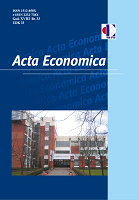Сиромaштво у предтрaнзиционом периоду- искуства одабраних земаља Источне Европе
Poverty in the pre-transition period - experience of the selected Eastern European countries
Author(s): Velinka TomićSubject(s): Economic policy, Government/Political systems, Economic development, Financial Markets, Fiscal Politics / Budgeting, Socio-Economic Research
Published by: Економски факултет Универзитета у Бањој Луци
Keywords: Poverty; transition; recession; growth; social polic
Summary/Abstract: Process of transition in Eastern European countries is complex phenomena consisting of four parallel process: simultaneous process of economical, political, constructional and cultural transformation. Or, other way out its is process of creating market economy, political democracy, constitutional state and civil society. That is why transition causes a series of disturbances with, like poverty does, significant and heavy consequences for citizens. Word “poverty” means different for different people. It is very unique for specific area, specific groups, households or specific persons, but there is no part of the world insensitive to poverty. Poverty is the multidimensional problem, and it must be treated multidimensional as some aspects are mutually related and caused (taken measures in one aspect can influence others). Experiences of the most successful transitional economies which are already members of the EU show that even starting conditions are of critical importance, but that crucial and reforms on the unified levels are also important for growth. The analysis of the initial conditions which marked some economies and societies, might be helpful for better consideration of the transition process through the prism of poverty.
Journal: Acta Economica
- Issue Year: 6/2008
- Issue No: 9
- Page Range: 97-118
- Page Count: 22
- Language: Bosnian, Croatian, Serbian

